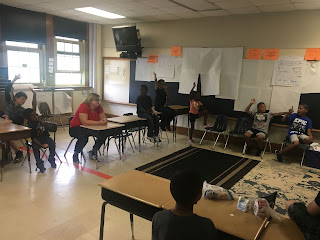I'm torn about the Common Core movement. Yes, there are problems with implementation -- you can't test something that hasn't been taught yet. But setting that to one side -- what do you think about the common core itself?
I'm impressed with the standards that I've seen -- they emphasize skills, mostly critical thinking, research and writing skills. These are skills I value highly and would love to see all my students come to college with. But I work in my little corner of the world (academia) and, while I prize these skills, I wonder what others think.
I also wonder about how people are working out the details of turning standards into actual lesson plans. How creative can you be? Are you forced to use problem-based learning, if that is not your style? (One reader raised -- and dismissed that concern.) How will differentiated instruction work with the Common Core?
Many of you are working on this right now -- how are you finding the process? Is it exciting and fruitful -- or another top down mandate that blacks your ability to teach? Let's get a conversation going in the comments section.
Subscribe to:
Post Comments (Atom)
Democracy in the Classroom
Because we believe in empowering kids, we give the students decision making power. Every day during morning meeting, students have the opp...

-
I had a lovely lunch with one of New York state’s newest teachers this week. We talked about our summer program, chatted about jobs and f...
-
I'm torn about the Common Core movement. Yes, there are problems with implementation -- you can't test something that hasn't be...
-
Working out is important -- but it isn't the end goal! Children do a lot of writing in school -- they fill out worksheets, answer re...

From Jessica:
ReplyDeleteI have yet to meet a teacher who likes the Common Core. The standards may look good on paper - though from a literature perspective, the turn away from creative pieces to non-fiction is troubling. The percentages seem arbitrary...70% non-fiction? Who came up with that? The Common Core is too closely linked to the School Reform Movement (Rhee, Gates, Walton family) to be trusted. And its implementation has confirmed this for me. It has required costly training that is not content based. It is date-driven and is about compiling data on each student and teacher that can be stored by In-Bloom. The English teachers were pulled from the classroom 8 times last year and it was not to study the writing pieces more closely. Some of it was to grade exams at other schools. Part of the AAPR/Common Core implementation means that teachers cannot be TRUSTED to determine their own curriculum on a class by class basis, cannot be trusted to create their own exams, and cannot be trusted to grade their own tests. In our district, we were completely demoralized by this. It took hours from planning, teaching, and kids. When you look at what is happening alongside CC...mass school closings in poor neighborhoods, unfair measures for city teachers vs suburbs (see Carol Burris' article in the Washington Post on this), and the end of autonomy for teachers, one can't help but see it as an insidious mandate - a wolf in sheep's clothing. I am doing curriculum writing this summer; we're not ready yet, but we are being pushed to teach the same things on the same day, with the same assessments...this data would then be entered into a database. This kind of lockstep mentality is driving people from the profession in droves. For the first time, I cannot in good conscience encourage my best students to go on in this profession. Many states are beginning initiatives to do away with tenure and require teachers to reapply yearly based on their student test scores. In Florida, a teacher told me that teachers were being denied home loans because they did not have permanent work. If we look at countries, where education is striving...the opposite is happening. In Finland, for example, the best college graduates go into teaching. It is a respected PROFESSION. Kids have more recess, more art. Teachers work less hours, are paid more, and there is little to no standardized testing.
Here's a link to the article by Carol Burris that Jessica mentioned. Worth a read:
ReplyDeletehttp://www.washingtonpost.com/blogs/answer-sheet/wp/2013/03/04/principal-i-was-naive-about-common-core/
As a nonprofit director who specializes in writing, designing, and implementing educational and artistic programs for primary and secondary grade students, I echo Jessica's sentiments. There's little room for creativity and flexibility on the teacher's behalf. Being in tandem with the APPR, the CC is a bureaucratic sledgehammer that hurts the craft of teaching rather than strengthen or support it. As a candidate for the Syracuse City School District school board, I would also add that at face value, a "common core" makes sense in regards to the fact that we need a sound rubric to measure performance. HOWEVER, it must be designed (if not totally, at least partially with majority agreement) by those whom it is meant to evaluate. I don't know enough about how it was crafted and derived...were teachers involved? Were administrators who also have to implement the APPR involved? It is also not practical for Special Ed. teachers. I have a friend who is a Special Ed teacher and Clary Middle School who is evaluated on the same rubric as students who aren't in special needs classes...that doesn't even make sense. It seems as if it was just imposed as opposed to being a communal decision we all (at least as a majority) agree with as being a sound rubric of evaluation. Testing and evaluating is meant to be informative, not the final determinant for "progress."
ReplyDelete